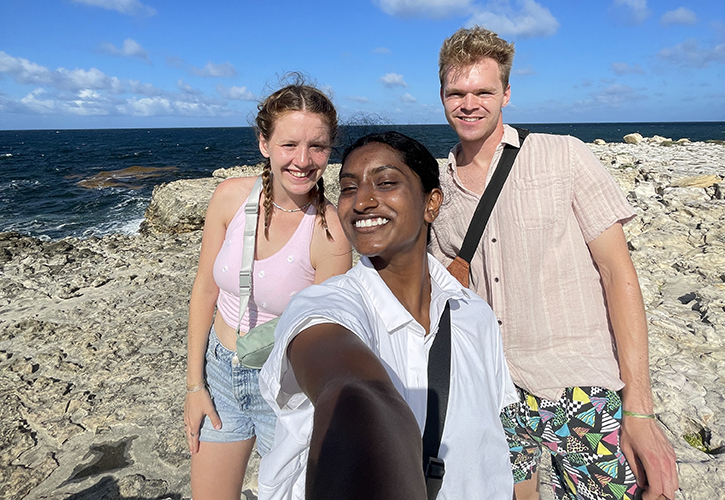Hanley Sustainability Institute

Sustainability: A different game across the world
By Elizabeth Philip
Summer is approaching and students are beginning to consider and confirm the many opportunities available to them this summer. We will be highlighting three high-impact summer experiences our students have participated in.
I always knew climate change and sustainability were viewed and implemented differently across the world, even across the U.S. But I never fully understood until I witnessed the difference in person.
This past summer, I had the opportunity to intern with the Department of Environment of Antigua and Barbuda with two other UD students for 10 weeks. A reality that I wouldn’t have even been able to dream of on my own.
I was able to to work on a variety of amazing projects including capacity building workshops and electric vehicle transitions. Throughout the summer, I submitted reports and wrote press releases for the office. I was even able to witness the installation of a hurricane resilient wind turbine.
The most interesting thing I witnessed was the difference in the perception and understanding of sustainability and climate change that was informed by lived experience and the different issues that they subsequently face.
Antigua and Barbuda is considered a SIDS, or small island developing state. These nations face unique issues. They are small, meaning they have fewer people to carry out necessary tasks for a nation to function and fewer resources to function in the international market. On top of this, they are considered to still be developing. They do not have as many stringent regulations, and, therefore, many actions and inactions can occur without consequences. In addition, they may not have systems to take care of things. For example, individuals in wealthy nations have the extra income and resources to upgrade to a new car every few years. Large, wealthier nations, such as Japan, export “old” cars to smaller developing countries, such as Antigua and Barbuda. Thus, the newest cars in Antigua and Barbuda are about five years old. Once Antiguans are done with their cars, they do not have a place to dispose of them. It was not uncommon to see broken-down cars on the sides of every street and in every yard on the Island. There must be a system in place.
Economically, Antigua and Barbuda is heavily dependent on its beaches and tourism. More than 50 percent of its GDP comes from its tourism sector. That means its beaches and natural beauty are a huge asset. However, due to climate change, this sector is and will continue to be threatened. Not only are those working in the Department of Environment aware of this, but so are many individuals on the island.
Climate change, specifically, is a large cause of concern in Antigua and Barbuda. Climate change and its consequences are acknowledged. They are aware of its consequences to the planet and their nation. They specifically call out climate change and work to increase the resilience and adaptability of the nation. Here in the U.S., especially at UD, we tend to label anything to do with climate change under sustainability, but they don’t. They are direct in their work and diction and specifically call out climate change.
This is not to say that the way we talk and work through these issues here in the U.S. is wrong, but rather, it emphasizes the difference that it is perceived and acted upon. We are a wealthy nation that has many geographies and experiences climate change and the movement toward a more sustainable future at different rates. With a nation as large as ours, there are many individuals with many different values and experiences which influence our actions and diction. Antigua and Barbuda is smaller with a very similar geography across the entire island with one industry dominating their economy. There is greater variety in values and experiences in the U.S. than in Antigua and Barbuda. This makes change harder to progress in the U.S. versus Antigua and Barbuda. However, this is not an excuse for the U.S. because it is nations like us that are greatly contributing to the large threats to SIDS across the globe.
The U.S. is large and wealthy with a diversity of values and experiences. Antigua and Barbuda is a nation with more shared values and experiences still working to develop their economy while greatly depending on one sector. They are directly threatened by climate change, and they are seeing it today. They are actively working to mitigate these impacts, make their community more resilient and work in strong collaboration with the United Nations. The U.S. has a unique set of challenges, values and experiences that need to be individually understood to move toward sustainability, while Antigua and Barbuda have just as much of a unique set of circumstances they are facing.
Globally, nations need to move toward a more just and sustainable future, but a just and sustainable future looks different in every nation and region depending on the environmental, economic and social framework of that area.
